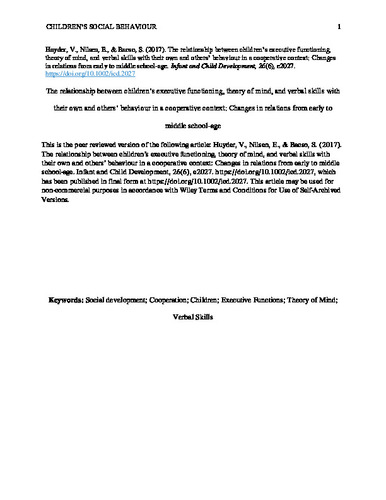| dc.contributor.author | Huyder, Vanessa | |
| dc.contributor.author | Nilsen, Elizabeth S. | |
| dc.contributor.author | Bacso, Sarah A. | |
| dc.date.accessioned | 2021-09-21 13:51:58 (GMT) | |
| dc.date.available | 2021-09-21 13:51:58 (GMT) | |
| dc.date.issued | 2017-02-28 | |
| dc.identifier.uri | https://doi.org/10.1002/icd.2027 | |
| dc.identifier.uri | http://hdl.handle.net/10012/17449 | |
| dc.description | This is the peer reviewed version of the following article: Huyder, V., Nilsen, E., & Bacso, S. (2017). The relationship between children’s executive functioning, theory of mind, and verbal skills with their own and others’ behaviour in a cooperative context: Changes in relations from early to middle school-age. Infant and Child Development, 26(6), e2027. https://doi.org/10.1002/icd.2027, which has been published in final form at https://doi.org/10.1002/icd.2027. This article may be used for non-commercial purposes in accordance with Wiley Terms and Conditions for Use of Self-Archived Versions. | en |
| dc.description.abstract | Learning to behave in socially competent ways is an essential component of children's development. This study examined the relations between children's social, communicative, and cognitive skills and their behaviours during a cooperative task, as well as how these relationships change at different ages. Early school-age (5–8 years old) and middle school-age (9–12 years old) children completed tasks to assess their executive functioning (i.e., inhibitory control, working memory, and planning), theory of mind, and verbal skills and participated in an interactive cooperative task. Because children participated in pairs, dyadic data analysis was used to examine the effect of individual characteristics on children's own and their partners' social behaviour. Results indicated that better theory of mind was related to lower levels of the competitive behaviours demonstrated by younger children, as well as by partners. In contrast, for older children, planning and verbal skills related to lower levels of competitive behaviour. The associations of theory of mind and planning skills with behaviour were significantly different between the early and middle school-age groups. Findings suggest that children may utilize different skills at various developmental stages to guide their social behaviours. Findings have implications for theories of children's social development, as well as for interventions aimed at enhancing social skills. | en |
| dc.language.iso | en | en |
| dc.publisher | Wiley | en |
| dc.relation.ispartofseries | Infant and Child Development; | |
| dc.subject | Social development | en |
| dc.subject | Cooperation | en |
| dc.subject | Children | en |
| dc.subject | Executive Functions | en |
| dc.subject | Theory of Mind | en |
| dc.subject | Verbal Skills | en |
| dc.title | The relationship between children's executive functioning, theory of mind, and verbal skills with their own and others' behaviour in a cooperative context: Changes in relations from early to middle school-age | en |
| dc.type | Article | en |
| dcterms.bibliographicCitation | Huyder, V., Nilsen, E., & Bacso, S. (2017). The relationship between children’s executive functioning, theory of mind, and verbal skills with their own and others’ behaviour in a cooperative context: Changes in relations from early to middle school-age. Infant and Child Development, 26(6), e2027. https://doi.org/10.1002/icd.2027 | en |
| uws.contributor.affiliation1 | Faculty of Arts | en |
| uws.contributor.affiliation2 | Psychology | en |
| uws.typeOfResource | Text | en |
| uws.peerReviewStatus | Reviewed | en |
| uws.scholarLevel | Faculty | en |

